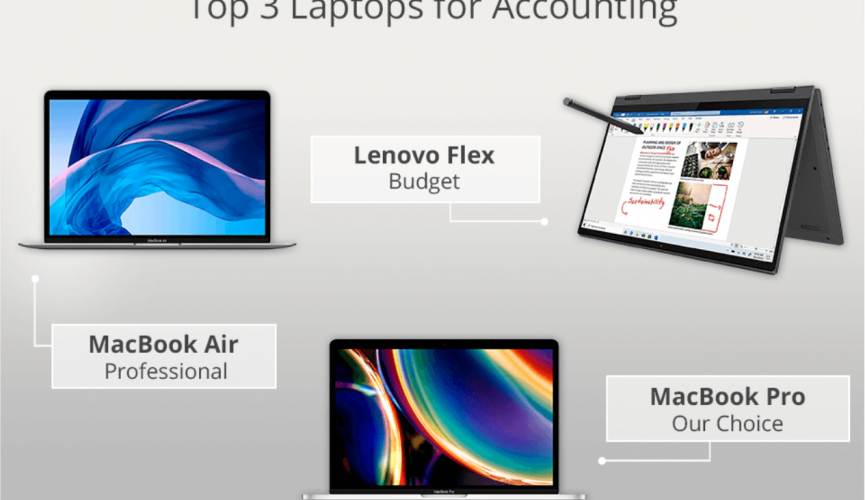In today’s fast-paced digital landscape, professionals from various industries rely heavily on laptops to carry out their tasks efficiently. Accountants, podcasters, and traders are no exception. Each of these fields demands specific requirements from a laptop to ensure optimal performance and productivity. In this guide, we will delve into the essential features to consider when selecting the best laptops for accountants, podcasting, and trading.
Laptops for Accountants: Balancing Power and Portability
Accounting professionals handle complex financial data, use specialized software, and often multitask between spreadsheet applications, email clients, and web browsers. To meet these demands, a laptop for accountants should strike a balance between power and portability.
- Performance: A laptop with a powerful processor, such as an Intel Core i5 or i7, or an AMD Ryzen equivalent, is crucial for smooth multitasking and running resource-intensive accounting software. A minimum of 8GB of RAM is recommended, though 16GB is even better for handling large datasets.
- Display and Keyboard: Accountants spend a considerable amount of time staring at screens and typing, so a laptop with a high-resolution display and a comfortable keyboard is essential. A Full HD (1920×1080) display ensures crisp financial data visualization.
- Battery Life: Since accountants might work remotely or during client meetings, a laptop with extended battery life is advantageous. Look for laptops with at least 8-10 hours of battery life to ensure productivity throughout the day.
- Storage: Opt for laptops with SSDs (Solid State Drives) instead of traditional HDDs (Hard Disk Drives) for faster data access and application loading times. Aim for at least 256GB of SSD storage.
- Connectivity: Multiple USB ports, an HDMI output for presentations, and a reliable Wi-Fi connection are essential for accountants who often need to connect to external devices and networks.
Laptops for Podcasting: Creativity Unleashed
Podcasting has emerged as a popular medium for sharing ideas, stories, and expertise. Podcasters require laptops that can handle audio editing, recording, and content creation. Here’s what to look for:
- Processing Power: Similar to accountants, podcasters benefit from a laptop with a powerful processor. An Intel Core i7 or equivalent AMD processor is recommended for seamless audio editing in software like Adobe Audition or Audacity.
- RAM and Storage: To handle large audio files and multitasking while editing, podcasters should opt for laptops with at least 16GB of RAM and ample storage space. An SSD is crucial for quick access to audio files and software.
- Audio Quality: A laptop with decent built-in microphones and audio output is a plus, but podcasters often use external microphones and headphones for superior audio quality. USB ports and compatibility with audio equipment are essential.
- Display and Graphics: While podcasting doesn’t demand high-end graphics, a laptop with a clear display and accurate color representation can aid in video editing for promotional content.
- Portability: Many podcasters are mobile, conducting interviews or recording on the go. A lightweight and portable laptop can make a significant difference in maintaining flexibility.
Laptops for Trading: Precision and Performance
Trading, especially in the fast-paced world of financial markets, requires a laptop that can handle real-time data analysis and execution of trades. Speed and reliability are paramount:
- Processor: A powerful processor is non-negotiable for traders who need to analyze live market data and execute trades swiftly. Look for laptops with the latest Intel Core i7 or comparable AMD processors.
- Graphics: While traders don’t necessarily need high-end graphics, a dedicated GPU can accelerate data visualization and analysis, particularly when working with complex charts and graphs.
- RAM and Storage: Trading platforms can be memory-intensive. Laptops with at least 16GB of RAM are recommended, and SSD storage ensures rapid access to historical and real-time data.
- Multiple Monitors: Trading often involves monitoring multiple windows simultaneously. Some laptops offer support for external monitors, which can enhance productivity by allowing traders to keep track of multiple data streams.
- Cooling System: Extended trading sessions can generate heat, potentially affecting laptop performance. A laptop with an efficient cooling system helps maintain consistent performance during critical trading hours.
- Reliable Connectivity: A stable and fast internet connection is vital for real-time data updates and quick trade executions. Additionally, a variety of ports for connecting to trading peripherals is beneficial.
In conclusion, professionals in fields as diverse as accounting, podcasting, and trading have unique laptop requirements that cater to their specific tasks. Choosing the best laptop involves considering factors such as processing power, memory, storage, display quality, and connectivity. Investing in a laptop that aligns with the demands of your profession can significantly enhance your productivity and overall work experience. Whether it’s number crunching, audio editing, or financial analysis, the right laptop can be the cornerstone of success in these competitive industries.

